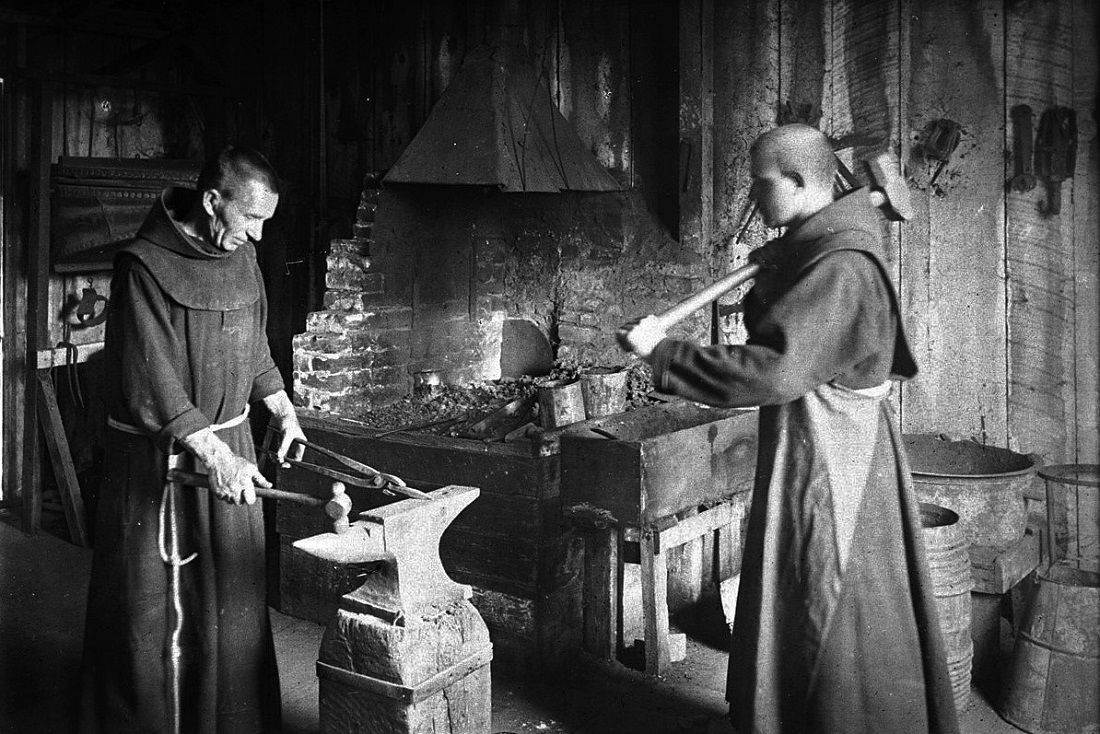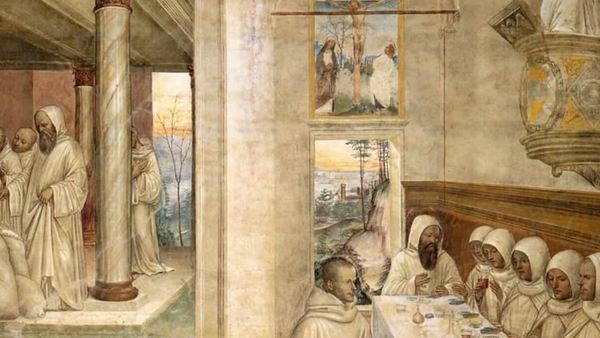We Christians, no less than other human creatures, are interested in ourselves. Deformed versions of this interest are narcissistic: under that rubric, we think of ourselves as if we were intrinsically valuable and important and good, and then we forget that whatever value, importance, and goodness we have has been given to us by the triune LORD whom we worship. That gift denies us anything of our own. Less deformed versions of our concern with ourselves begin and end with the thought that we are creatures, brought into being out of nothing by our LORD for purposes scarcely apparent to us. Thinking about ourselves in this way has the double good of requiring us to think about our LORD, and of deflating our pretensions. It is not easy to think like that, however; narcissism was not abolished by Jesus, even if its eventual overcoming is assured, and a good deal of Christian theological anthropology, professional-hectoring and popular-sentimental both, shows narcissism's deleterious effects. We Christians remain disposed to concern about how the world seems to us and what it may provide us, rather than to discernment of how to live in it. That is because the fat and greedy pagan ego drowned in the baptismal bath works still upon us, and will until the end of the age.
The deleterious effects of narcissism are evident in the work of many, Christian and otherwise, who advocate leisure as good for us, appropriate to us, necessary for us, a blessing to us, an aid to contemplation, the foundation of culture, and so on. Christianity is more bracing than this: we Christians think, when we are thinking clearly, that between conception and death in this cataclysmically damaged world we should neither expect nor seek leisure. What we should expect, and will certainly find, is the double curse of death and work. Each of those involves pain, so we should expect a lot of that as well. Our task as Christians is not to look for islands of leisure-for-contemplation exempt from the eddy and flow of work and suffering and death; were we to do that, Wordsworthianly and narcissistically to wander lonely as clouds gasping at the beauties of the cosmos (which are real and many, though damaged) and of ourselves (which are real and many, though damaged), we would become fascinated by phantasms, especially those of our own inner life (what depths in what we feel and see! how interesting it is to us to be us! what complex and delightful pieces of work we are! how rich the lights and sounds of our inner theaters! how lovely it is to be at the center of our own lives!) and would, too quickly, learn to close our eyes to the pressure of pain and the imminence of death—our own, that is, and all else's, too.
If not leisure, then, what? What can we expect here below, in hac valle lacrimarum? What have we been promised? How should we respond to that promise?
Suppose we understand leisure as otium, which is to say the state or condition of doing nothing, of being otiose, of occupying a place in which nothing is expected and there is nothing to do but . . . what? If there were a place of otium for human creatures, it would be hell: a no-place capable of occupation only by the solipsist who has reached the end of narcissism, which is to be the only thing there is, to live in a world in which relation with others, animate and inanimate, is impossible because they have been abolished. They might, after all, were they to be there with those who have become otiose, ask something of them, and then perfect leisure would itself be abolished. In perfect leisure what there is to do, therefore, is just and exactly nothing. Perfect otium requires the abolition of all others, and therefore also of the cosmos. In it, what there is to look at is yourself. And—it is surely clear, and it is Christian doctrine to say so—you are not that interesting. The thought of a world containing only yourself, which is a world the leisure-seeker half-imagines (it cannot be fully imagined), should prompt the shudder of horror. Christianity does not allow this as a goal (some kinds of paganism do, including most that fascinate us now), and does not offer it to us as a gift or as a promise. The Christian gift and promise are different, and in them leisure has no part to play.
Two things, in the fallen world, do have a part to play. They are work and prayer, or, if you prefer (and probably this is a better thing to say) work and worship. St. Benedict's command, ora et labora, has this right. Work is the temporary remedy for the damage done by the Fall; and worship (prayer) our only anticipation of and proleptic participation in life eternal. Neither is leisured. Both are relational. Neither is narcissistic. Both divert narcissism's self-fascination outward into other-directed action.
More on work. Since the Fall we have necessities that must be met if we are to go on living. These include: food and drink; sleep; shelter and clothing to protect us from the elements; care for the sicknesses and corruptions of body and mind. Work's principal purpose is to provide these necessities. That is why it is a curse: it responds to damage, and does so feebly and ineffectually. In spite of all our work, we still suffer and die. But we Christians are required to meet these necessities. We are required, then, to work without end until our work fails us. When it does, we die. Work, then: labora! It is an imperative. Sometimes, there is more to work than this; sometimes it is beautiful, sometimes it is pleasing, sometimes it gives glory to the LORD. But those blessings are epiphenomenal. To treat them as if they were more, as if they ought be expected or sought, is to misunderstand what work is and to take the first steps toward treating leisure-as-otium as a good.
More on worship. The LORD has given us the sacraments and a pattern of life ordered by response to them. We are baptized, and thus redeemed from the curse of death; we eat and drink the body and blood of Jesus, and are thus moved toward a condition in which we can embrace the Triune LORD fully in the resurrection. We confess our sins and receive absolution for them, thus being healed of self-effected damage. And by unction we are prepared for death. We need, we must learn how, to participate in these gifts and be re-formed and transfigured by them. We are given all we need to do that; our only task is to accept it. But that habitual and repeated acceptance takes time, and so we need time exempt from work—exempt, that is, from the failing struggle for food, clothes, shelter, and medicine. But time exempt from work is not time for leisure-as-otium; no, it is the time of Sabbath rest which, in a damaged world like ours, means only a breath-long respite from work in order to worship. Our worship prefigures for us what a world without work—a heaven—would be like. It is not a world of leisure; it is, rather, a world in which staving off death is no longer necessary because death is no longer with us. In that world, work is not replaced by leisure, but rather with ecstatic love in which there is no space for the thought of or desire for leisure because the self that might want it is now absorbed beyond the possibility of first-personal awareness in the inbreathing and outbreathing rhythm of the gift given and returned.
Ora!, then: that is the other thing Christians do and must do. And there's no third thing, nothing between work and worship here below. There is no otiose time; there is only the metronomically death-dealing time of work and the breathingly repetitive life-giving time of the liturgy.


